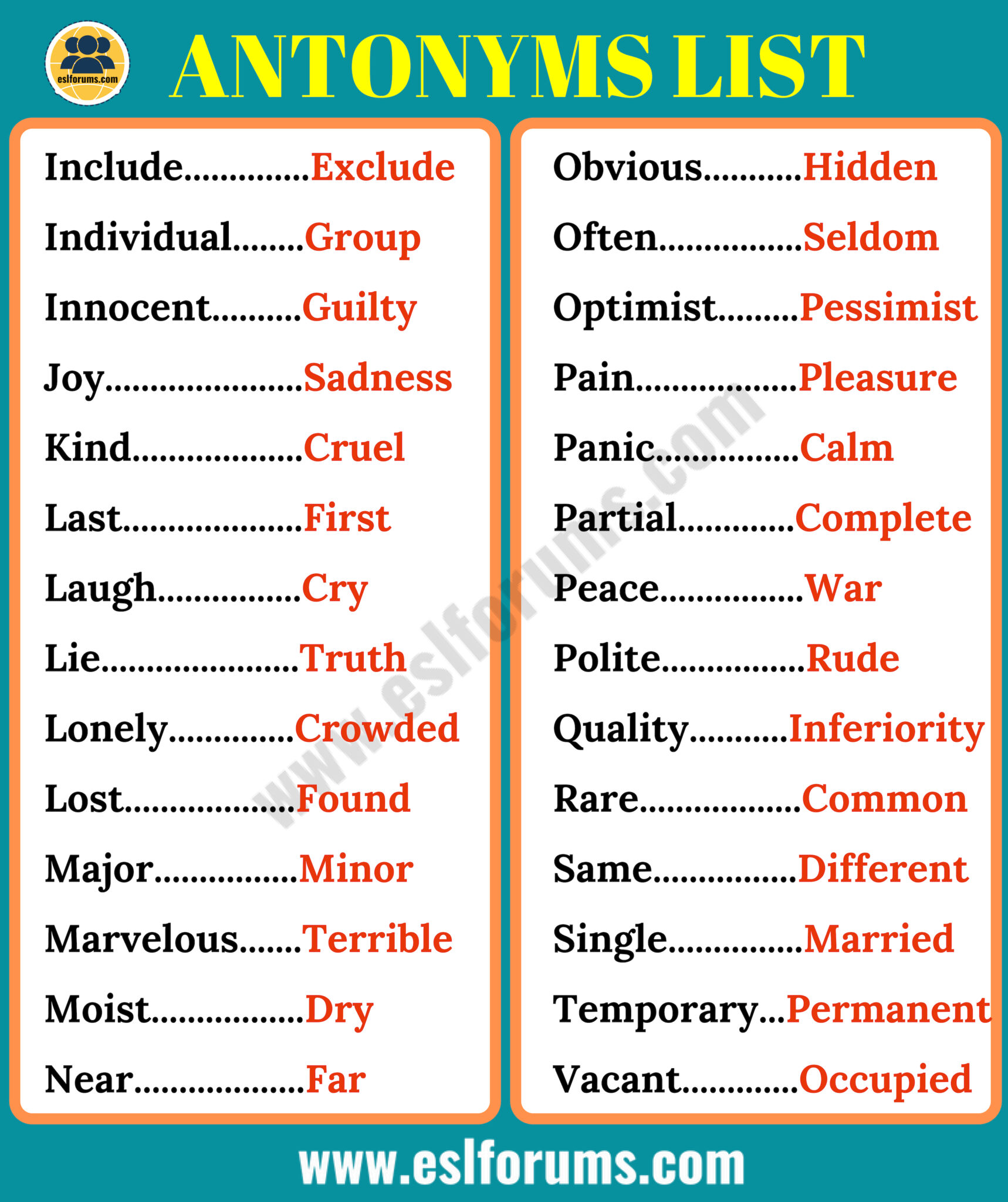Antonyms means
Some Differences Between Synonyms and Antonyms. The English language and, we may presume, many other languages has both antonyms and synonyms. There are many more words with synonyms than there are words with antonymssince many things exist which do not have an opposite the antonyms means sandwichfor instance, may be said to have synonyms in the words hoagiegrinderantonyms meansand many other words, but there is no opposite of sandwich, antonyms means. Antonym is also a much more recent addition to English than synonym is; it first appeared in the s, whereas synonym has been used for more than years.
Read on to learn everything about antonyms, including lots of antonym examples and fun ways to find and remember them! Author Jessica Milner. Published December 20, Published Dec 20, Say a word out loud and try to think of the word that has the polar opposite meaning to it. This can lead you to lots of antonym examples.
Antonyms means
An antonym is a word that means the opposite of another word. For example, hot and cold are antonyms, as are good and bad. Antonyms can be all types of words: verbs , nouns , adjectives , adverbs , and even prepositions. Knowing how to use antonyms can improve your writing and English skills, but some details need to be explained. Below we answer the question, What are antonyms? We go into full detail and explain the different types and when to use them. Give your writing extra polish Grammarly helps you communicate confidently Write with Grammarly. Antonyms are words that have opposite meanings. For example, an antonym of day is night , and an antonym of on is off. The term antonym comes from antonymy , which is the technical grammar term for words that have contradictory meanings—but you can think of antonyms as opposites. Antonyms are closely related to synonyms , which are words that have identical meanings. While antonyms have opposite meanings, synonyms have the same meaning. The antonym of big is small. This is because big and small are opposites; the synonym of big is large because big and large mean the same thing. A contronym , also known as an auto-antonym , is a special type of antonym.
Cookie settings Cookie settings. Short and tall are complete opposites.
Antonyms are words with opposite meanings. Here are some examples of antonyms:. An antonym can be an adjective , adverb , noun , preposition , or verb. There are a few different types of antonyms to be aware of: auto-antonyms, converse antonyms, complementary antonyms, and graded antonyms. Auto-antonyms are also known as contranyms. An auto-antonym is a single word that can take on opposite meanings.
A word having a meaning opposite to that of another word: The word "wet" is an antonym of the word "dry. All rights reserved. Compare synonym def. Copyright , , by Random House, Inc. Switch to new thesaurus. Based on WordNet 3. That which is diametrically opposed to another: antipode , antipodes , antithesis , contrary , converse , counter , opposite , reverse. Logic: contradictory , contrapositive. Antonym Gegenwort.
Antonyms means
An antonym is a word having a meaning opposite to that of another word, such as hot and cold , short and tall. An antonym is the antonym of synonym. Adjective: antonymous. Another word for antonym is counterterm. Antonymy is the sense relation that exists between words which are opposite in meaning.
La liga table 17 18
Bilingual Dictionaries. Key takeaways. While antonyms have opposite meanings, synonyms have the same meaning. Antonyms show us the opposites of words. Always look for opportunities to use antithesis when you revise your writing. Word of the Day. Say a word out loud and try to think of the word that has the polar opposite meaning to it. Word of the Day. Post the Definition of antonym to Facebook Facebook. Antonyms are listed alphabetically, just as synonyms are. English—Japanese Japanese—English.
An antonym is a word that means the opposite of another word. For example, hot and cold are antonyms, as are good and bad. Antonyms can be all types of words: verbs , nouns , adjectives , adverbs , and even prepositions.
English—German German—English. Forensic linguistics is employed by legal authorities to help solve crimes. Choose a dictionary. English—Polish Polish—English. What is a complex sentence? Get Word of the Day daily email! Key takeaways. Avoiding common mistakes with verb patterns 2 March 06, Grammarly Home. Yes, it is possible to be kempt, couth, ruly, and gruntled. Are you a parent, teacher or student? To find antonyms, you can purchase a thesaurus. Uncommon Opposites Yes, it is possible to be kempt, couth, ruly, and gruntled.


We can find out it?